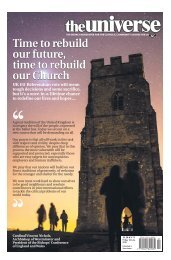The Universe 5th August 2016
The weekly newspaper for the Catholic community across the UK
The weekly newspaper for the Catholic community across the UK
You also want an ePaper? Increase the reach of your titles
YUMPU automatically turns print PDFs into web optimized ePapers that Google loves.
u • FINANCE 04 FRIDAY 05.08.16<br />
Summer<br />
holiday savings<br />
Raising a family leaves many parents<br />
struggling for cash – and the summer<br />
holidays are a particular pinch point.<br />
New research has shed light on exactly<br />
how much parents can expect<br />
to fork out for their little and not so<br />
little ones.<br />
Parents of children under the age<br />
of 25 estimate that, on average, just<br />
over a fifth (21 per cent) of their<br />
monthly household income is spent<br />
directly on items for their children,<br />
according to a study. And the average<br />
parent expects to be supporting their<br />
child financially well into their adulthood<br />
– until the age of 29.<br />
u<br />
finance<br />
By Vicky Shaw<br />
Mums typically think the cut-off<br />
point for financially supporting their<br />
child will be 30. Dads, rightly or<br />
wrongly, are a bit more optimistic –<br />
hoping their child will be fully fledged<br />
financially by the age of 27.<br />
Parents of boys may find themselves<br />
getting off a bit more lightly –<br />
Annie Plaskett, from specialist insurance broker Towergate, says: “It’s vital<br />
home owners are aware that homes left empty for an extended period of time<br />
can leave them exposed to a number of risks and threats – including burglary,<br />
theft, squatting, vandalism and water damage.<br />
“If your home is going to be left vacant for a longer period, it’s crucial you<br />
check your home insurance policy and contact your insurer if you are unsure –<br />
often standard policies are only valid for up to a month.”<br />
Here are some tips from Towergate for keeping your home safe while you're away:<br />
1<br />
2<br />
Make sure your home is regularly inspected – perhaps ask family, friends or<br />
neighbours to check it.<br />
Make the property look occupied to minimise interest by thieves or<br />
vandals. Cancel existing deliveries such as milk or newspapers.<br />
Consider having lights on timers so they come on in the evening and perhaps<br />
park a car on the drive – maybe a friend’s or a neighbour’s.<br />
3<br />
How... can you protect your home<br />
during a long summer holiday?<br />
Protection against forcible entry through external doors and windows is<br />
essential. Insurers will often only insure against forcible entry.<br />
Poundnotes<br />
Financial fact<br />
We’re now using mobile<br />
banking apps around 7,610<br />
times a minute, according<br />
to the British Bankers’<br />
Association (BBA).<br />
Strongest June for<br />
mortgage lending<br />
since 2008<br />
Mortgage lenders have<br />
recorded their strongest<br />
figures for the month of<br />
June for eight years.<br />
<strong>The</strong> Council of Mortgage<br />
Lenders (CML) said around<br />
£20.7 billion of mortgages<br />
were handed out in June,<br />
a 16 per cent increase<br />
compared with May’s total<br />
of £17.8 billion. <strong>The</strong> CML,<br />
which represents banks<br />
and building societies,<br />
said the latest lending<br />
total was the highest for<br />
June since the £22.6 billion<br />
reached in 2008.<br />
Margate is Britain’s top<br />
seaside property hotspot<br />
Margate has been named<br />
the top hotspot for property<br />
price increases among<br />
Britain’s seaside towns.<br />
<strong>The</strong> average property in<br />
the Kent seaside town<br />
now sits at £202,276 –<br />
a 12.5 per cent increase<br />
since July 2015, according to<br />
property website Zoopla.<br />
Lawrence Hall, a<br />
spokesman for Zoopla,<br />
says: “If you’re considering<br />
investing in a beach front<br />
property, you should<br />
consider those resorts<br />
receiving government<br />
investment – it does have<br />
a positive impact on<br />
property values.”<br />
Interest rate on bond<br />
will double if<br />
Manchester United win<br />
Savers are being offered a<br />
new bond where the<br />
returns could double –<br />
if Manchester United win the<br />
<strong>2016</strong>/17 premiership title.<br />
Virgin Money has<br />
launched the one-year bond<br />
as part of a partnership<br />
with Manchester United.<br />
<strong>The</strong> new Manchester<br />
United Champions Bond<br />
offers savers an annual<br />
rate of 1.25 per cent,<br />
fixed for one year. But the<br />
interest rate will double to<br />
2.5 per cent if the club<br />
wins the <strong>2016</strong>/17 Premier<br />
League title.<br />
Savers can hold anything<br />
from £1 to £1 million in<br />
the account.<br />
as the findings, put together by Sainsbury’s<br />
Bank and website MoneyMag<br />
pie.com, also suggest that girls are<br />
more expensive to provide for.<br />
From birth until the age<br />
of five, girls are around<br />
£300 a year more expensive<br />
a year than<br />
boys, according to<br />
the study.<br />
<strong>The</strong> cost gap<br />
doubles during the<br />
teenage years, with<br />
parents of girls aged<br />
between 14 and 18<br />
typically forking out<br />
nearly £600 a year more than<br />
parents of boys of the same age.<br />
<strong>The</strong> research suggests the gap may<br />
in part be due to girls’ clothing being<br />
more expensive.<br />
More than 2,000 people from across<br />
the UK took part in the survey and<br />
parents were asked to estimate the<br />
annual cost of raising their children.<br />
Meanwhile, another report has<br />
found that the summer holidays leave<br />
parents even more out of pocket<br />
than Christmas.<br />
A survey among parents of children<br />
aged between three and 13<br />
years old found that, on average, parents<br />
expect to spend £1,445 per child<br />
on activities over the summer holidays<br />
– which is around £408 more per<br />
child than they would spend during<br />
the Christmas break.<br />
Those taking part in the survey for<br />
Epson EcoTank printers were asked<br />
how much they plan to spend on activities<br />
such as trips to the cinema, going<br />
on play dates with friends, meals out,<br />
food shopping and summer clubs.<br />
So how can you keep<br />
your day-to-day<br />
living costs down –<br />
particularly at<br />
this tricky time of<br />
year? Here are<br />
some suggestions<br />
from Sainsbury’s<br />
Bank and<br />
MoneyMagpie.com:<br />
1<br />
Have a “use it up<br />
month”. Start with<br />
the bathroom. How many unused<br />
and unfinished hair, cosmetic and<br />
skin products are in the cupboards?<br />
Don’t buy any new shampoos,<br />
conditioners, make-up or lotions until<br />
you’ve used them all up this<br />
month. Do the same with your<br />
cleaning products.<br />
2<br />
Let a student cut your hair. Get<br />
your haircuts at hairdressing<br />
colleges where students can gain experience<br />
– and you get a cheap, or<br />
free, new ’do.<br />
3<br />
Write a menu plan. A shopping<br />
list will prevent you buying<br />
items you don’t need.<br />
4<br />
Find free family entertainment<br />
locally. Look at your local council’s<br />
website to see what entertainment<br />
they’re offering during the school holidays.<br />
Also check out local libraries and<br />
museums as they often have free or<br />
cheap events in the holidays.<br />
5<br />
Throw a swap party. Have your<br />
friends and neighbours round<br />
for a swap party – where you all bring<br />
items you no longer want and swap<br />
them with each other. It can be a<br />
great way to get some new clothes or<br />
used baby items.<br />
6<br />
Don’t be shy – haggle. Even<br />
high street shops have great<br />
deals – perhaps start by asking what<br />
kind of discount you can get if you<br />
pay in cash or if you buy two items<br />
rather than one.<br />
7<br />
Consider buying big ticket<br />
items at auctions. <strong>The</strong>re are<br />
hundreds of auctions happening<br />
around the country selling everything<br />
from cutlery to armchairs, beds and<br />
cars. Many home items – particularly<br />
furniture – can be cheaper if you buy<br />
second hand.
















